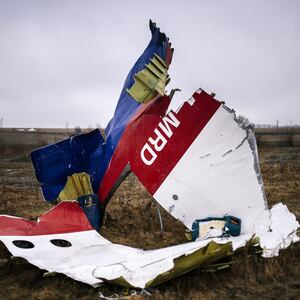STANYTSIA LUHANSKA, Ukraine—Negotiators from Russia and Ukraine met in Paris last week for eight hours of talks on de-escalating the crisis on their border. Both sides agreed to renew a fragile ceasefire which has officially been in place since 2014.
It didn’t even hold for 24 hours.
Tanya Adamchuk, 15, and her grandmother Tatiana showed The Daily Beast the damage gunfire had caused to the teenager’s bedroom window the following night in their village of Katerynivka, which is right on the front line between Ukraine and the pro-Russia rebel-controlled region of Luhansk. The girl—who said she had stepped out of her bedroom at the time—and her grandmother recalled the sound of machine-gun fire erupting throughout the night.
Tanya’s family knew better than to expect real peace after the renewal of the Normandy truce on Thursday. Despite multiple ceasefires over the years, the gunshots, explosions, and firefights around them have not let up in seven years, ever since Russian-backed separatists took over several towns in the region soon after President Vladimir Putin made a decision to annex Crimea, 400 miles to the south. Hundreds more ceasefire violations have been reported by the OSCE Special Monitoring Mission to Ukraine over the past week.
“In reality, there was no truce—the fighting continued. We heard blasts and machine guns on Sunday and on Monday, even during the day,” Larisa Gritsenko, head of the Ukrainian humanitarian mission Proliska-Zolote, told The Daily Beast.
Now, an already precarious situation may devolve into even more chaos and violence. With Russian troops massing around Ukraine’s borders, Eastern Europe is bracing for a disastrous war, and those living near the front line, or crossing it regularly, are the most vulnerable.
In Stanytsia Luhanska, an urban settlement which sits outside the one-kilometer “gray zone” between the front lines of Eastern Ukraine, hundreds of citizens from the separatist Luhansk region have been flocking in through the only checkpoint that allows entry into Ukraine-controlled territories, either with the intention of moving there permanently, picking up essential supplies, or collecting their pension payments from the Ukrainian government.
Their desperation, spurred by the dire economy of war-torn Luhansk, makes way for a number of illicit businesses run by civilians like Yevgeny Prestinsky, who charges people to drag their heavy belongings or ferry elderly or disabled relatives across the no man’s land to the Ukrainian checkpoint and back.
“Thanks to the hysterical news about Putin’s big war our business is improving. More zombies move to permanently live in Ukraine,” Prestinsky told The Daily Beast. “Their numbers grow. A week ago I helped a family with 14 wheelbarrows of stuff.” According to a Ukrainian military official at the crossing, 2,500 people had crossed by noon on Saturday.
Prestinsky admits that his business exploits people in need, but says there is “no clean job at war.” As he speaks, he watches a young woman in a white down jacket walk her mother through the crossing to the Ukraine-controlled side. “Look at that white walker,” he says. “The mother has just crossed and instead of giving her a cup of tea, the young one takes her mother straight to the bank machine to withdraw her Ukrainian pension!”
A Ukrainian soldier stationed at the checkpoint told The Daily Beast that “Ukraine is open as a May rose,” explaining that all citizens are allowed to cross through and bring back whatever they’d like, “except for weapons, drugs, alcohol, and cigarettes.” But during the pandemic, militia authorities in Luhansk made the decision to limit residents’ travel into Ukraine to only once a month, making it even more difficult for families to get by.
Yulia Shulika, a 53-year-old woman who was crossing back into Luhansk, told The Daily Beast she made “good profit” on her visit to Ukraine-controlled territories, where she managed to pick up some olive oil and a few packs of instant coffee. “It is really miserable in Luhansk, there are piles of garbage everywhere,” she said of the situation on the other side. And now, “Another war. How many wars can one human life take?” Shulika blames neither Vladimir Putin nor Kyiv authorities for her troubles. She says only she is “squeezed between two fires.”
Several blocks in Stanytsia Luhanska have been destroyed in the war, with many citizens traumatized by the violence they’ve endured in the past few months. Yelena Boryshko, a 22-year-old woman who works in forestry, recalled one particularly terrifying night on Dec. 3 when Russia-backed militants fired 122mm and 152mm artillery through the town. “I was standing at a bus stop in tears, too scared to move,” Boryshko told The Daily Beast.
Beyond the violence, Boryshko also struggles to make enough money to put food on the table. “Prostitutes in our town make ten times more than me, but I cannot find that job. I guess I am not attractive enough,” she said.
For the residents of this town, the prospect of a Russian invasion is only the latest addition to a long list of nightmarish grievances. “You remembered this crisis now, because of the war news in headlines,” Yevgeny Kaplin, the founder of the Proliska mission, told The Daily Beast. “But people have actually been dealing with the war all these years, struggling to survive.”
Back at the checkpoint, Prestinsky received another client, an elderly couple whose 45-year-old daughter needed to get a new passport in Ukraine. Turns out, the daughter didn’t have the proper paperwork to pass through. “The war is a bitch,” Prestinsky concluded.







